Granola is a popular breakfast staple for a quick, on-the-go meal or easy afternoon snack, but is granola gluten-free? The answer may surprise you! Find out what to look for and which brands to purchase.
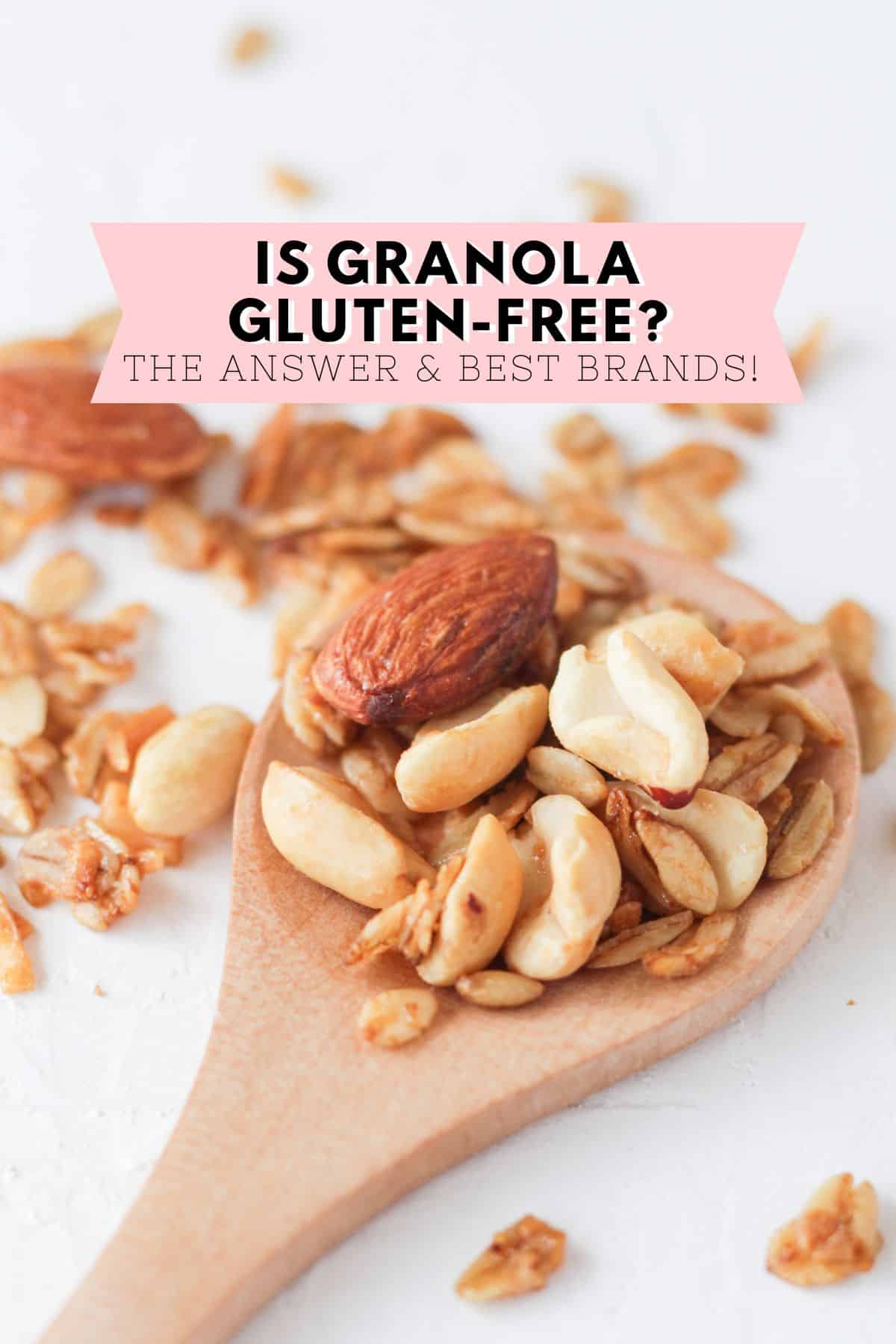
Jump to:
- Is Granola Gluten-Free?
- Are Oats Gluten-Free?
- What are Purity Protocol Oats?
- What is Gluten?
- Granola Ingredients
- How Do I Find Gluten-Free Granola?
- Why Should Granola Be Certified Gluten-Free?
- Best Gluten-Free Granola Brands
- Info on Popular Granola Bars
- Can Celiacs eat granola?
- More "Is It GF?" Articles
- Comments and Ratings
Granola is considered by many to be a healthy breakfast option, loaded with whole grain oats, healthy fats, and other healthy ingredients. It can be a satisfying breakfast when served cold with milk or over greek yogurt and fresh fruit. Crunchy granola clusters even make the perfect healthy snack, whether for after school or doing some midnight snacking!
All health benefits aside, if you are new to the gluten-free diet, it may surprise you to find out some seemingly gluten-free foods, actually are not! Take frozen French fries, for example! Unfortunately, the same is true for granola.
You may be thinking to yourself, why isn't granola gluten-free? It's made with oats! Aren't those gluten-free? Sadly the answer is not likely, unless you're specifically seeking out gluten-free versions, even then it's still complicated. Keep reading to learn more about granola and how to find the best gluten-free options!
Is Granola Gluten-Free?
No, not all granola is gluten-free. If you need to eat granola, you must seek out granola that is certified gluten-free or granola that uses only purity protocol oats. This is due to the fact that regular oats are not considered gluten-free.
Some granola and granola bars can actually contain wheat flour or wheat germ, whether as a binder or for added health benefits, another reason it is important to always read the ingredient label!
Are Oats Gluten-Free?
Oats are a tricky ingredient in the gluten-free diet because while oats themselves are naturally gluten-free, they are easily contaminated with wheat while growing in the fields and during manufacturing.
This means if you are on a strict gluten-free diet due to celiac disease or other medical condition, any oat product you consume must be made with certified gluten-free oats and/or purity protocol oats.
Furthermore, even certified gluten-free may not be good enough, as seen recently with issues that have been reported by Gluten-Free Watchdog on Safe+Fair Granola, which is certified gluten-free by GFCO. The Honey Crisp Apple Pie Granola tested above the <10ppm threshold set by GFCO, as tested by the Gluten-Free Watchdog.
This isn't the only time gluten has been found in oat products with the certified gluten-free symbol. High levels of gluten were found in Aussie Bites, made by Best Express Foods, which ultimately led to GFCO pulling certification from the brand.
What are Purity Protocol Oats?
Purity protocol oats are oats that are grown using a strict method to ensure the oats are gluten-free from seed through milling.
In order to be classified as purity protocol oats, the oat producers must use dedicated gluten-free oat growers, dedicated gluten-free milling facilities, controlled distribution, and have a means of tracing the oats from seed through distribution.
What is Gluten?
Gluten is the protein found in the grains of wheat, barley, rye, and spelt. Most people do not need to avoid gluten in their diets. In fact, a gluten-free diet is not typically recommended unless you have a health condition that requires it.
But for those with auto-immune conditions triggered by gluten, such as celiac disease or gluten ataxia, where the only recommended treatment is strict avoidance of gluten, the gluten-free diet is absolutely life-saving.
There are other medical conditions that require a gluten-free diet as well. Those include but are not limited to non-celiac gluten sensitivity, eosinophilic esophagitis, or wheat allergy (but be wary, not all gluten-free foods are also wheat free!)
Granola Ingredients
Granola is a baked oat mixture made with simple ingredients that is cooled and broken into crunchy clusters. Ingredients tend to include some combination of the following:
- Whole rolled oats, a great source of whole grains in a balanced diet.
- Nuts, a good source of healthy fats, whether in the form of whole nuts or almond flour.
- Seeds, such as pumpkin seeds, chia seeds, or flax seeds. Seeds also provide a good source of healthy fats and fiber.
- Sweetness in the form of brown sugar, organic honey, or pure maple syrup.
- Liquid oil, such as vegetable oil or coconut oil.
- Other flavors and mix-ins, such as coconut flakes, dried fruits, chocolate chips, or peanut butter, are often added to enhance the texture, sweetness, and flavor.
What makes granola so great is it's versatility. There is already a multitude of store-bought options in just about any flavor you can imagine, including maple granola, peanut butter granola, and chocolate granola.
You can easily make your own granola using gluten-free oats, with this easy gluten-free granola recipe or this popular pumpkin granola recipe. Homemade granola is even more customizable than store-bought versions, as you can control every ingredient.
How Do I Find Gluten-Free Granola?
When shopping for gluten-free granola at the grocery store, it's important to look for granola that is at least certified gluten-free, even better if the oats are purity protocol oats. This means the granola has been tested and validated gluten-free by a third party.
Look for these symbols when purchasing granola or granola bars. These products have been validated gluten-free by GFCO, NSF, Beyond Celiac, or the National Celiac Association.
💌 Want to Save This?
Unsubsribe at any time.
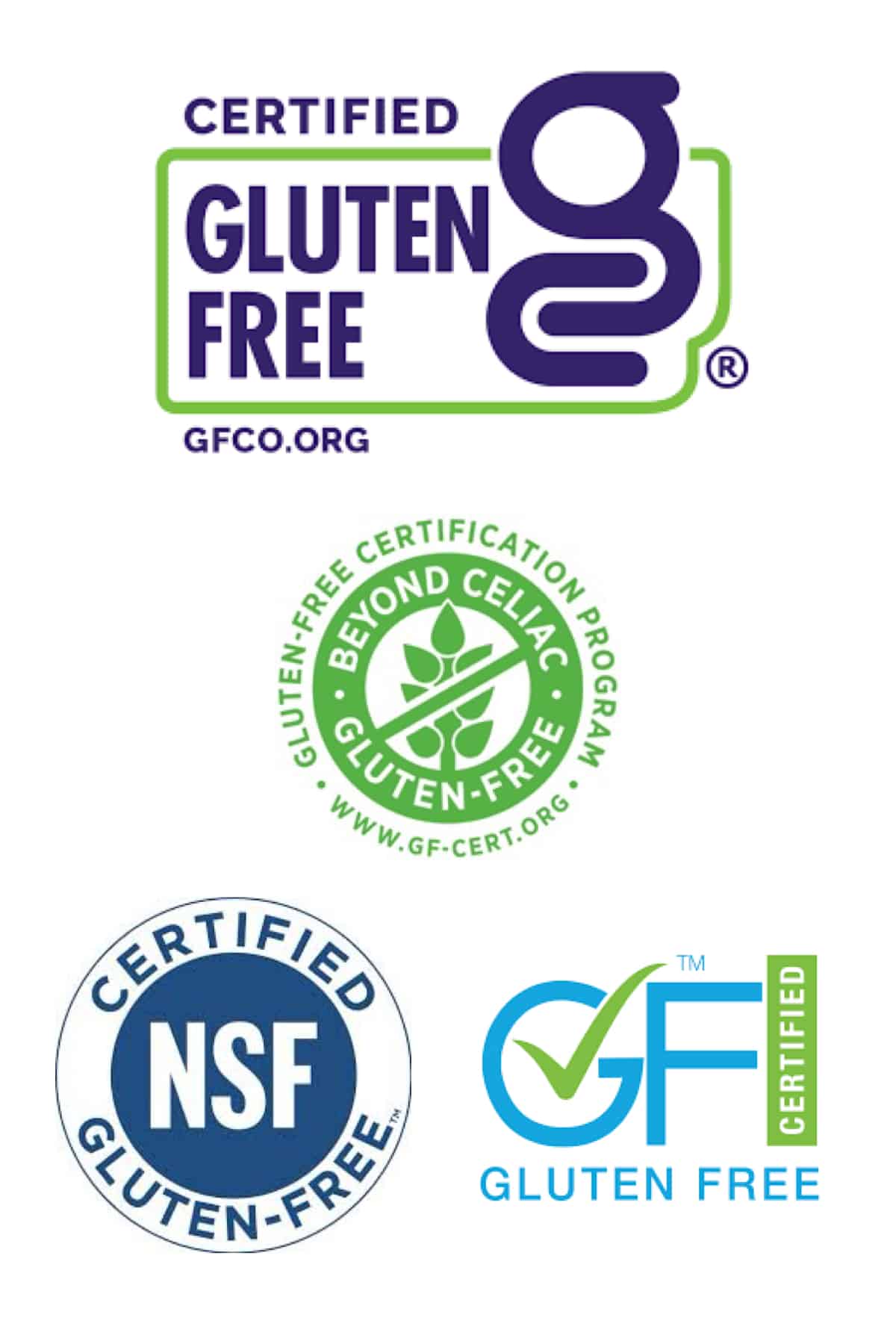
Why Should Granola Be Certified Gluten-Free?
Gluten-free certification is important for oat products, including granola and granola bars. This is because oats are so easily contaminated with wheat that the risk for gluten is high.
The FDA rule states that a product must contain less than 20 ppm of gluten to bear the gluten-free label but the FDA does not require testing to prove that. Given that oats are such a high risk ingredient, it is especially important to take those extra precautions yourself.
Items only labeled gluten-free may not be good enough when it comes to products with oats because you have to trust the company truly understands the importance of that label and the risks that oats impose, rather than using it as a marketing term. Any brand can label its granola gluten-free, but that does not necessarily mean they have taken the extra steps to validate the product.
Certification offers a level of security and confidence.
- When certifying a product the brand must follow established guidelines from a third party, rather than using their own systems.
- The company must verify sourcing, manufacturing procedures, and final product testing in order to gain certification.
- When a company takes the extra steps to certify a product gluten-free, not only are they are conveying confidence that their product is truly gluten-free, they are proving it as well.
While gluten-free certification isn't a fail-safe option when it comes to oats, it's better than products not certified at all.
Best Gluten-Free Granola Brands
There are plenty of gluten-free granola and granola bar options available. Some are also grain-free, meaning they do not contain oats at all. This may not be an exhaustive list, but it's a pretty good start.
**Always look for the certified gluten-free symbol on products that contain oats. This is important because some companies sell both regular and certified gluten-free products.**
Please always double check labels, companies can and do change the certification status of their products.
- Annie's: Two varieties of gluten-free granola bars, Chocolate Chip and Oatmeal Cookie.
- Bakery on Main: Made in dedicated gluten-free facility and certified by GFCO. Reported to use purity protocol oats in all products.
- Bear Naked: Look for certified gluten-free varieties, such as Dark Chocolate Almond Grain Free Granola.
- Bob's Red Mill: Homestyle granola varieties (Maple Sea Salt, Cranberry Almond, Peanut Butter, Lemon Blueberry, and Coconut Spice) are certified gluten-free. Be sure to look for the certified gluten-free symbol as not all varieties are certified.
- Caveman Foods grain-free granola
- Flax4Life
- Gluten-Free Prairie
- Good & Gather (Target): Not all are gluten-free but some options are available.
- Jessica's Natural Foods
- LiveGfree & Simply Nature (Aldi): Look for certified gluten-free varieties.
- Made Good: Uses only purity protocol oats in their products.
- One Degree Organic
- Purely Elizabeth
- Safe + Fair: All varieties are certified gluten-free. But be aware that this granola has had some issues recently where the granola was testing above <20ppm gluten. This may be a product to avoid until more information is gathered and the issue has been sorted out.
- The Perfect Granola
- Udi's
- Wildway
- Without a Trace
Click for a complete list of certified granola from GFCO or National Celiac.
Info on Popular Granola Bars
All of this information also applies to granola bars as well! Most of the popular, commercially available granola bars are not gluten-free. They contain regular oats and sometimes wheat flour! Be careful when buying granola bars and look for certified gluten-free varieties from one of the brands listed above.
No, Nature Valley granola bars are not gluten-free. Only their line of protein bars, which do not contain oats, are labeled gluten-free.
Not all kind bars are gluten-free. Kind states, "For all products that make a 'Gluten Free' claim, we complete testing to ensure they meet FDA’s requirements for 'Gluten Free'."
Their products are not certified gluten-free at this time.
No, Quaker Chewy Granola Bars are not gluten-free. They contain whole wheat flour.
Kashi chewy granola bars with oats are not labeled gluten-free and the soft baked breakfast bars contain wheat. Kashi currently offers two grain-free granola bars with a gluten-free label, but the bars are not certified gluten-free.
No, all Sunbelt Bakery Chewy Granola Bars and Soft Baked Bars contain wheat flour.
Not all of Annie's Granola Bars are gluten-free. Look for the items clearly marked gluten-free with the certified gluten-free label.
While some products are labeled gluten-free, they are not certified gluten-free.
While some products are labeled gluten-free, they are not certified gluten-free.
Can Celiacs eat granola?
This is a complicated issue. While technically, someone with celiac disease can eat granola that has been certified gluten-free or made with purity protocol oats, it is definitely one of the more risky foods you'll encounter.
There are many reports of "gluten-free" oats and granolas that are contaminated with gluten above the 20ppm safety threshold.
The safest granola for someone with celiac disease to consume would be a grain-free granola that is made without oats or other grains. This would help avoid any possible cross-contamination issues that are more common amongst products made with oats.
Gain access to our FREE exclusive mini-series:
Gluten-Free Baking and Lessons Learned!
Plus, be the first to know about new recipes and exciting announcements!
📩 Sign up for the Mini-Series Here! 📩
Disclaimer: The information in this article is the personal opinion of the author and for educational purposes only. This is not medical or nutritional advice. Please consult a doctor or medical professional before making changes to your diet or regarding any health related decisions. Ingredient information was accurate at the time of posting but should always be verified by the consumer by checking the product ingredient label for the most up to date information.
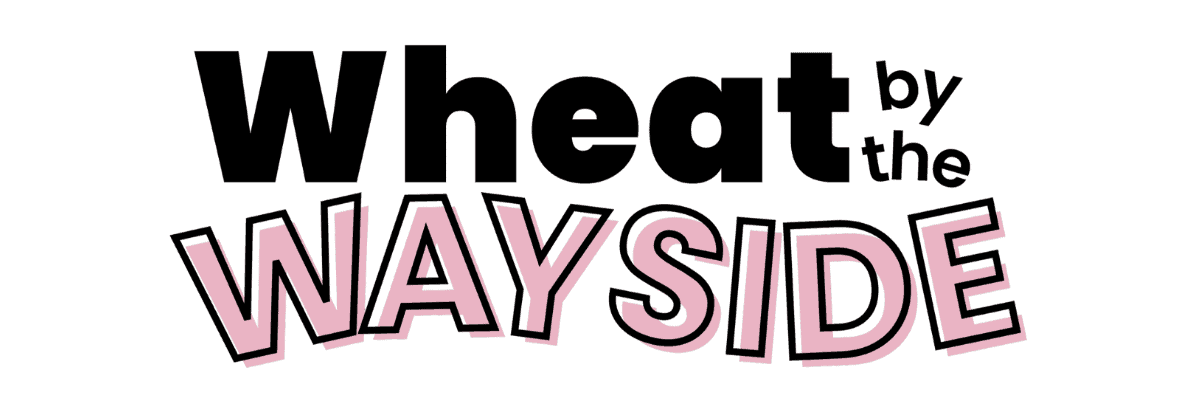
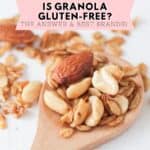
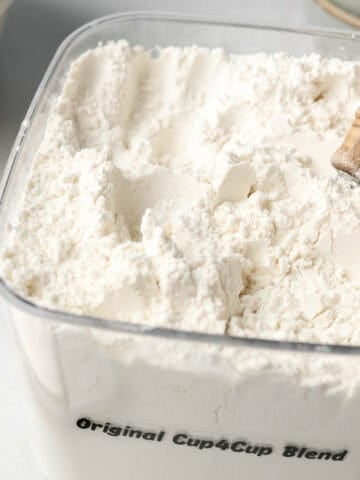


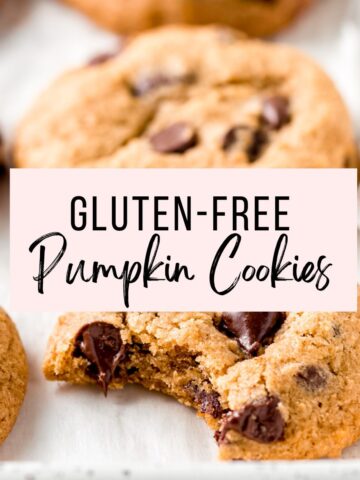
Comments
No Comments